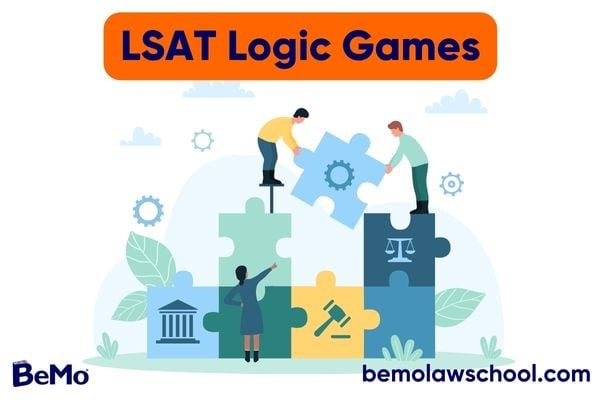Use our toughest LSAT logic games to test your readiness for the test! As part of your LSAT preparations, you must include a different kind of LSAT practice questions in your LSAT study schedule, including the LSAT logic games. Our article includes different types of LSAT logic games so you can really test yourself! Check out our samples below or share with a friend who is studying for the LSAT!
>>Want us to help you get accepted? Schedule a free initial consultation here <<
Listen to the blog!
LSAT Logic Game #1: Sequencing
Six friends - Alex, Bob, Carla, Dina, Eric, and Fred - are lining up to buy tickets for a movie. Based on the information below, determine the order in which they stand:
Bob stands somewhere to the left of Eric.
Dina stands exactly two places to the right of Carla.
Eric is not next to Dina or Alex.
Fred is directly in front of Alex and directly behind Carla.
LSAT Logic Game #2: Sequencing
Six books – M, N, O, P, Q, and R – are arranged in a vertical stack on a shelf. The following conditions apply: O is placed above N but below P. M is the topmost book. R is placed somewhere below O.
LSAT Logic Game #3: Sequencing
Five students – T, U, V, W, and X – are ranked based on their scores in a test. The following conditions apply: T scored higher than U but lower than X. W scored the lowest. V scored higher than T.
LSAT Logic Game #4: Sequencing
Seven people – A, B, C, D, E, F, and G – are waiting in a line to enter a concert. The following conditions apply: A stands somewhere to the left of E. B is third in line. G stands immediately to the right of F. D stands to the right of C but to the left of G.
LSAT Logic Game #5: Sequencing
Six artists – H, I, J, K, L, and M – are scheduled to perform at a concert. They will perform one after the other. The following conditions apply: J performs before K but after L. I performs either first or last. M performs immediately after H.
LSAT Logic Game #6: Grouping
Six students - A, B, C, D, E, and F - are to be divided into two debate teams, Team 1 and Team 2, with three students on each team. The division must adhere to the following conditions: A and E must be on the same team. B and C cannot be on the same team. If D is on Team 1, B must be on Team 2.
LSAT Logic Game #7: Grouping
Four artists - M, N, O, and P - are to be divided between two galleries, Gallery X and Gallery Y, for an exhibition. The division must adhere to the following conditions: M and N cannot exhibit in the same gallery. If O exhibits in Gallery X, M must also exhibit in Gallery X.
LSAT Logic Game #8: Grouping
Five fruits - R, S, T, U, and V - are to be divided into two fruit baskets, Basket 1 and Basket 2. Each basket holds three fruits. The distribution must obey the following conditions: R and S must be in the same basket. T cannot be in a basket without U. V must be in Basket 2.
LSAT Logic Game #9: Grouping
Six animals - W, X, Y, Z, A1, and B1 - are divided between a zoo and an animal sanctuary. Three animals are placed in each location. The following conditions apply: If W is in the zoo, X must be in the sanctuary. A1 and B1 cannot be in the same location. If Y is in the sanctuary, Z must be in the zoo.
LSAT Logic Game #10: Hybrid (Sequencing and Grouping)
Five runners - A, B, C, D, and E - are participating in a race. They finish in places 1 through 5 and belong to two teams: Red and Blue. The teams must adhere to the following conditions: A finishes before B but after C. B and D are on the same team. E is on the Red team and finishes fourth.
LSAT Logic Game #11: Hybrid (Sequencing and Grouping)
Scenario: Four singers - F, G, H, and I - are performing in a concert. They perform in slots 1 to 4 and belong to two genres: Classical and Jazz. The following rules apply: F performs before G but after H. I performs third and sings Jazz. H sings Classical music.
LSAT Logic Game #12: Hybrid (Sequencing and Grouping)
Five dancers - N, O, P, Q, and R - are performing in a show. They perform in slots 1 to 5 and belong to two dance styles: Ballet and Contemporary. The rules are: P dances immediately after O. Q dances Ballet and is fifth. R dances before N and is in Contemporary.
LSAT Logic Game #13: Hybrid (Sequencing and Grouping)
Five dancers - N, O, P, Q, and R - are performing in a show. They perform in slots 1 to 5 and belong to two dance styles: Ballet and Contemporary. The rules are: P dances immediately after O. Q dances Ballet and is fifth. R dances before N and is in Contemporary.
LSAT Logic Game #14: Mapping
Mapping On a street, there are five houses – W, X, Y, Z, and A – positioned next to each other. Based on the following clues, determine the order of the houses: Y is immediately to the left of A. Z is not next to either Y or A. W is to the right of Z.
LSAT Logic Game #15: Characteristics
Four paintings – B, C, D, and E – are displayed in a gallery. Each painting is either modern or classic and is either large or small. Using the following clues, determine the attributes of each painting: B is a small painting. C is the same style as B but larger. D is modern and large. E is classic.
LSAT Logic Game #16: Relationships
There are four people – F, G, H, and I. They have relationships based on the following: F is the sibling of H. G is the parent of I. H is older than I, but not the oldest.
LSAT Logic Game #17: Associations
Four people – J, K, L, and M – are associated with four objects: a book, a pen, a laptop, and a phone. Determine which person is associated with which object based on the clues: L is associated with the laptop. K has an object that starts with the same letter as her name. M doesn't have the book or the laptop. J does not have the phone.
FAQs
1. What are LSAT logic games?
LSAT logic games, officially known as the "Analytical Reasoning" section of the LSAT, are puzzles that test a student's ability to understand and analyze structured relationships and draw conclusions from them. They typically involve organizing, grouping, or sequencing elements based on a set of provided rules.
2. What is the maximum score I can get on the Analytical Reasoning section of the LSAT?
The Analytical Reasoning section consists of 4 games with a total of approximately 23 questions. A perfect LSAT score in this section would contribute 23 points to the LSAT's total 180-point scale.
3. What kind of LSAT logic games are there?
LSAT logic games can be categorized into several types, including ordering (sequencing), grouping (distribution), and hybrid games that combine elements of both. Additionally, there are less common game types like pattern, mapping, and circle games.
4. What kind of skills are LSAT logic games testing?
LSAT logic games primarily test analytical reasoning skills, requiring test-takers to organize, manage, and draw conclusions from complex sets of rules and scenarios. They assess your ability to understand structured relationships, make deductions, and apply structured reasoning to new information.
5. What other LSAT questions should I prepare with?
The LSAT consists of multiple-choice questions grouped into sections: Logical Reasoning (also known as Arguments), Analytical Reasoning (commonly referred to as Logic Games), and Reading Comprehension. Make sure to practice with samples for these question categories.
6. How should I prepare for LSAT logic games?
To prepare for LSAT logic games, start by familiarizing yourself with the various types of games (ordering, grouping, hybrid) using preparatory materials or courses. Practice consistently using timed sections to simulate test conditions and enhance speed. Finally, review each game thoroughly, understanding the underlying structure and strategies, and learn from any mistakes to improve accuracy. This is how to study for the LSAT.
8. When should I start studying for the LSAT?
When should I start studying for the LSAT is a common question students ask. You should start studying for the LSAT ideally 3-4 months before your test date to allow ample time for thorough preparation and practice. Beginning early allows for a more paced study schedule, enabling you to address weaknesses and take multiple practice tests.
9. How long is the LSAT?
The LSAT is approximately 3 hours and 30 minutes of testing time, but with breaks and administrative procedures, the total test day experience is about 4 to 5 hours. The exam consists of multiple-choice sections, each lasting 35 minutes, and a 35-minute unscored writing sample.

